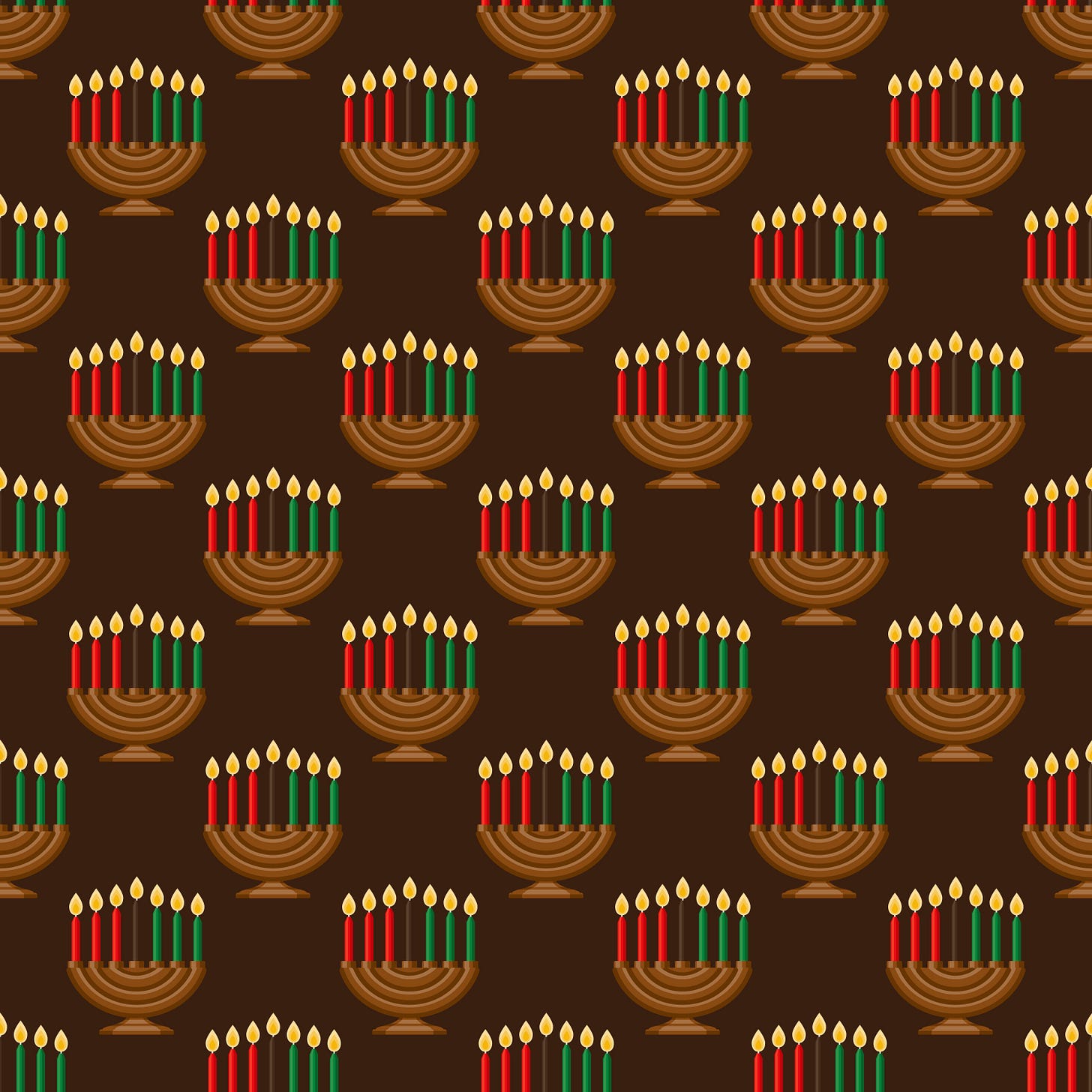
Coming in hot and late, in true Colored Peoples fashion, here are some mediations on the holiday of Kwanzaa. This marks the beginning of Tiny Violences’ Kwanzaa mini series, I hope you join me this week!
Created in the mid 20th century, it was former Black Panther, turned state operative, Dr. Maulana Karenga, in response to the mass commercialization of the Judeo-Christian holiday seasons. There have been debates about the validity or necessity of Kwanzaa, some of which are rooted in the anti-blackness the Black Panther movement sought to counter. Recently, more relevant arguments have emerged about the intent of Kwanzaa, from a man who was a known abuser of Black women. The latter debates seem the most nuanced, and mostly I’ve come to value taking on the responsibility of making meaning of the days leading up to a new year for myself.
The Seven principles, Nguzo Saba, that are each assigned to a day from December 26th through January 1st are meant to stir pride in the identities of those in the African diaspora whose traditions of our motherland have been obscured, bastardized, and erased because of the impact of colonial and imperial violence. There are some exciting materials made available on social media, that have offered the opportunity for discourse. These are useful and important, because we need to call into question the social-cultural forces that demonize this very Black holiday, but also broaden the discussion, leaving room for nuance. We can critique the shortcomings of both the man who took the bold action to create Kwanzaa and some of the destructive intentions of the seven days of acknowledgement. Critiquing social projects and cultural experiments, especially those that have been born out of the intent to decenter capitalism and reorient Black societal priorities towards the healing praxis of liberation feels like a major key in the Black Power Continuum. Check out the work of UCLA Graduate Student, Michael Anderson @knowyourrhythmm on Instagram, there you can learn about some of the intellectual efforts that are happening to help us grow closer to the evolving meaning and purpose of Kwanzaa.
The ritual of Kwanzaa has always been opaque to me, as a child growing up in the early 1990’s, Kwanzaa had gained popularity in the urban setting that shrouds my youth. Kente cloths, makeshift kinaras with candles of all colors and sizes, and the mysterious offerings for the altar, largely left me embarrassed and confused. One year, when I was just a grade school child there was a Kwanzaa program in the local community center. I grew up in a largely Puerto Rican community, during a time when (not so different from now frankly) the image of Africa, having dark skin, being associated with the continent was mostly source material for humiliating satire. In the wake of the generation sired by the intersections of movements for Black, queer and women’s liberation – there was very little room in popular culture for the appreciation of what a cultural ritual might mean for Black peoples in America. This was felt deeply in my child’s body, when the stiff orange, red, black and green Kente fabrics of the time were to be incorporated into the outfit of white shirt and leather skirt (which I loved) for our Kwanzaa recital.
Now, as an adult I have studied some materials on the importance of traditions, and the Official Kwanzaa Website, which quite frankly needs an update, centers the framework to how to practice. Every night, folks gather around an altar, there is a mat, a kinara and offerings of symbolic foods, presumably for the ancestors and towards a future, one I suspect is free and safe for Black peoples (and consequentially all peoples). From what I can recollect of that time, we, the group of neighborhood children recited the principles and their meanings, Umoja, Kujichagulia, Ujima, Ujamaa, Nia, Kummba, Imani; then sang the first verse and refrain of Lift Every Voice and Sing, then ate some snacks. This recital took place before the actual holiday, and I mostly felt self-conscious. Shows like In Living Color, or Comicview, films like I’m Gonna Get You Sucka made the ritualization of Blackness into a joke. The emergent media debate of the time on Ebonics and the legislation that continued to popularize the perceived criminality of those of us whose ancestors who were forcibly brought here for free labor, also tainted the importance of what could be a healing celebration. Then, there wasn’t information available to the everyday person who wanted to connect back to their culture, tools that would reinforce the pride we were meant to feel in our disparate identities. There wasn’t mass discourse into how a multitudinous community could unify a message and practice.
It has taken 30 years since then, and the advent of social media, with the broad reaching access of information via the internet to make these principles handy and to bring together many voices to examine and reinvent this time of year. I’m excited to see what Kwanzaa can be in the hands of Trans folks, women, queer people, and children who have the agency and creativity to transform this holiday into something holistic and meaningful to our community.
The first principle of Kwanzaa, that is oriented by the black center candle of the kinara is Umoja. It is symbolized by the Dagi Knot and is representative of the [desired] unity of many African cultures. Umoja is a Swahili word for unity; To strive for and maintain unity in the family, community, nation, and race. But what does that mean for me, a queer Black woman? It means, that now more than ever I have to exalt the power and sacredness of my community, the chosen family. The chosen family is crucial for our survival and is a fundamental principle for the many of us who have descended from slavery or have had to immigrate because of global imperialism.
As evidenced by the onslaught of misogynistic, colorist, queer hating commentary that floods the comment sections and serves as traffic driving clickbait, the queer black woman and femme must find sanctuary amongst her/their peoples. Brittney Griner wouldn’t have made it home without it, there wouldn’t have been anywhere else for Megan Pete (Megan Thee Stallion) to turn to online (if that is what she chose to do, since I’m speculating). The inventive and relentless actions of queer Black women who dedicated themselves to pushing counter-narratives in the face of the bombarding misinformation campaigns meant to minimize our harm, works to ensure our voices are not silenced, that our lives have meaning because millions of us care about each other’s existences. No, we’re not a utopia (not by a longshot), but we are a resilient community of people with disparate backgrounds and varying purposes, who are existing in the dystopia. We are living lives that are often questioned, subjugated by the state and erased from the general ledger of history; so in response we create our own archives, we build and support our own institutions. Parties, mutual aid funds, performances (even the most cringey ones on social media), social media groups, twitter threads, tiktok trends, faith spaces, restaurants, [aint no mo] bars, social clubs, and the like are examples of how we create unity in community. Specifically when this is done away from the white, cis-heteronormative gaze and intentionally separated from commercial interests, it is most effective.
Which leads me to today’s principle, Kujichagulia. This is one of my favorite words to say, and I hope more people name their children this. Black sounding names matter! After lighting the black candle, we light the first of three red candles to acknowledge Self Determination; To define ourselves, name ourselves, create for ourselves and speak for ourselves. It is symbolized by the Ahenwa, The Akan throne, symbol of national identity, cultural groundedness and rightful governance.
Audre Lorde said it best in her 1982 Speech “Learning From The 60s”: …there was usually some part of me guaranteed to offend everybody’s comfortable prejudices of who I should be. That is how I learned that if I didn’t define myself for myself, I would be crunched into other people’s fantasies for me and eaten alive. My poetry, my life, my work, my energies for struggle were not acceptable unless I pretended to match somebody else’s norm. I learned that not only couldn’t I succeed at that game, but the energy needed for that masquerade would be lost to my work.
The deliberate erasure of queer and trans voices from the movements for justice, equity and liberation of the 20th century have created the perfect storm for many folks to append the revisionist histories of Black legacies. The ways in which some of our best minds were shunned, pushed to the margins or were represented at a distance from their whole identities has born a resurgent culture of thinkers, artists, writers, musicians and makers who lead from and center their identities, without shame or censure. If it weren’t for the relentless works of Audre Lorde, Pat Parker, James Baldwin, Cheryle Clarke, the Combahee River Collective, Stormé DeLarverie, Marsha P. Johnson, Alice Walker, Pauli Murray, June Jordan and more, there could not be a space for someone like me to believe that my ideas, or my writing or my desires were valid. Self-determination is not just about the individual, it is about the personal work we do to strengthen the communities that house us and allows us to answer to the urgency of responsibility to one another.
The last day of Kwanzaa has been dedicated to the meditation of all seven of the principles but for me it feels important, especially as the year is drawing to a close, to reflect on the ways these principles manifest in my life. In all of our lives, it is important to name the ways in which we are contributing to a future that is inclusive of all Black people, and not in the performative and capitalistic ways that have been normalized on socials, but in ways that are personally transformative. When I think about the many ecological, social and cultural forces converging to mark the time in which we live, I can only hope that we are setting the stage for a brighter future, one that is sustainable. One that is safe, and beautiful and lush with creative energy. I suspect that by recognizing how I embody these principles on the regular, I will see the power of them. I will know that I’ve been able to reclaim the true intent of Kwanzaa in my life and can begin to shape how this ritual can help me close out my year.
Let me know you’ve made it to the end of this message by sharing how you’ve embodied Unity or Self Determination this year, or if that’s too much drop me a 🕯🪔 emoji.







🕯️🪔
🕯🪔